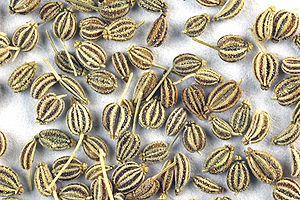- Ajowan
-
Ajowan 
Ajowan-Früchte
Systematik Euasteriden II Ordnung: Doldenblütlerartige (Apiales) Familie: Doldenblütler (Apiaceae) Unterfamilie: Apioideae Gattung: Trachyspermum Art: Ajowan Wissenschaftlicher Name Trachyspermum ammi (L.) Sprague Ajowan (Trachyspermum ammi Sprague; Syn.:Trachyspermum copticum (L.) Link, Carum copticum (L.) Benth. et Hook. f. ex C.B. Clarke, Ptychotis coptica (L.) DC., Ptychotis ajowan DC.) ist eine Gewürz- und Heilpflanze in der Familie der Doldenblütler (Apiaceae).
Der Name leitet sich von einem Sanskritwort mit der Bedeutung griechisch ab.
Inhaltsverzeichnis
Merkmale
Ajowan ist eine einjährige Pflanze. Sie wird bis zu 50 cm hoch und hat fein fiederteilige Blätter. Die Blüten sind weiß und erscheinen in den familientypischen Doppeldolden. Die Früchte sind knapp 1 mm große, ungefähr kugelförmige Spaltfrüchte mit ausgeprägten Längsrippen. Sie zerfallen nicht in die Einzelfrüchte.
Herkunft
Ajowan stammt wahrscheinlich aus dem östlichen Mittelmeergebiet, möglicherweise Ägypten. Er wird seit dem Altertum kultiviert und erreichte bereits im frühen Hellenismus Indien (vgl. den Namen). Die wichtigsten Anbaugebiete sind heute der Iran und Indien.
Inhaltsstoffe
Getrocknete Ajowanfrüchte (oft ungenau als Ajowansamen bezeichnet) enthalten bis zu 5 % ätherisches Öl, das zum größten Teil aus Thymol besteht.
Verwendung
Die getrockneten Früchte des Ajowans haben ein starkes Thymianaroma und schmecken brennend-aromatisch. Sie werden als Gewürz verwendet. In der indischen Küche dienen sie oft zum Würzen von stärkehaltigen Gemüsen wie z.B. Kartoffeln. Hülsenfrüchte, die in Indien eine große Rolle als Proteinquelle spielen, werden sehr oft mit Ajowan gewürzt, weil er deren Verdauung fördert.
Verwechslungen
Ajowanfrüchte werden trotz ihres ganz anderen Aussehens und Geruchs oft als Liebstöckelfrüchte gehandelt. Der englische Name von Ajowan, bishop's weed, wird gelegentlich als Bischofskraut fehlübersetzt, obwohl dieser Name im Deutschen für die Knorpelmöhre (Ammi visnaga) reserviert ist.
Heilwirkung
Das aus den Früchten (Fructus ajowani) durch Destillation gewonnene Ajowanöl diente früher als kommerzielle Quelle von Thymol, das als wirksames Expektorans vielfach Bestandteil von Hustentropfen ist, heute aber synthetisch produziert wird.
Quellen
- Encke/Buchheim/Seybold: Zander, Handwörterbuch der Pflanzennamen, 15. Auflage, ISBN 3-8001-5072-7
Weblinks

Bitte den Hinweis zu Gesundheitsthemen beachten!
Wikimedia Foundation.
